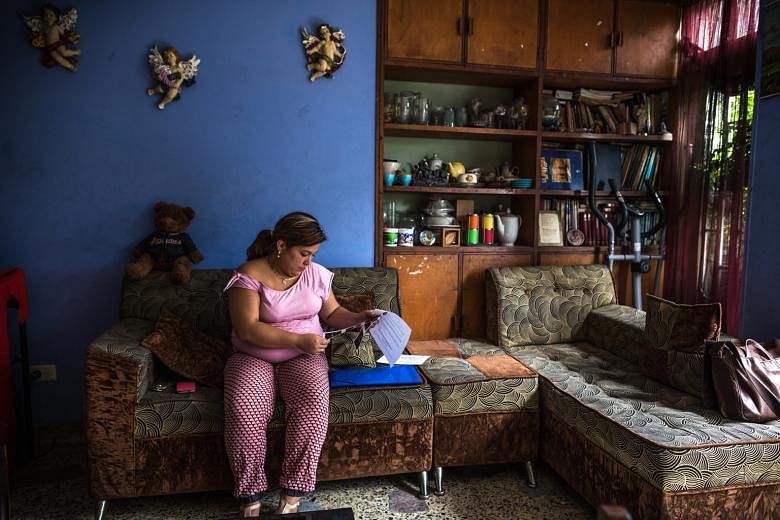BOGOTA (Colombia) • Nearly 3,000 pregnant women in Colombia are in an agonising position, having recovered from the Zika virus only to be left with a terrible dilemma.
Unlike in Brazil, the centre of the epidemic, some expectant mothers in Colombia are being given the choice to end their pregnancies, under laws that allow abortions in some cases.
Ms Margarita Rosa Barrios was six weeks pregnant when she began to feel the symptoms that every expectant mother here has come to dread: swollen eyes, aching joints and three days of fever. Just as she feared, she had the Zika virus.
Ms Barrios, 24, is not expecting just one child. She is carrying twins.
She is one of at least 25,000 Colombians who have contracted the virus, a number officials say could surge to 600,000. Most pregnant women who have contracted the disease in the country have not given birth, and no cases have been confirmed of infants born with abnormally small heads, a condition known as microcephaly.
Colombia has emerged as the second front in the battle against Zika in the Americas. But unlike in Brazil - where there have been an estimated 1.5 million infections dating to 2014 - in Colombia, the first cases of Zika were detected only in October.
Women here are now in the difficult position of considering - and, in some cases, having - abortions even before any microcephaly cases have appeared in the country.
"There's a lot we don't know about this disease," said Mr Fernando Ruiz Gomez, Colombia's Deputy Health Minister. "What we know is there's a growing disparity between what we're seeing in Colombia with Zika and the experience in Brazil."
Colombia is one of the few nations in Latin America with abortion laws that allow women to terminate pregnancies under a variety of circumstances, including rape, birth defects that make a foetus unable to survive outside the womb or the presence of risks to the pregnant woman's physical or mental health.
Some medical officials say that microcephaly is grounds for abortion.
Others have gone further.
Ms Barrios said her doctors offered an abortion, even though there is no evidence that the babies she is carrying have microcephaly.
"The doctor asked me if I might be ready to have two deformed children," she said. "How do you tell a mother that?"
Vanesa, a 28-year-old woman in the coastal city of Barranquilla, said she decided to end her pregnancy after she contracted Zika.
An ultrasound showed what doctors said could be a deformity, possibly microcephaly.
"I cried a lot," said Vanesa, who asked that her full name be withheld because she did not want others to know she had an abortion. "We are Catholics, and we prayed to God. We decided not to have the baby."
The issue is all the more complex because the scientific link between Zika and microcephaly in infants has not been proved. International health officials say only that the connection is "strongly suspected".
But in recent months, Colombia has made progress in what could be an innovative way of controlling the disease.
Dr Ivan Dario Velez, a tropical disease specialist at the University of Antioquia in Colombia, said scientists have successfully bred a mosquito that was resistant to Zika, dengue, chikungunya and yellow fever.
At the main hospital in Ms Barrios' hometown, the north-eastern city of Cucuta, more than 80 pregnant women have come in with the virus since October, said its director, Dr Juan Agustin Ramirez.
No woman, he said, should be forced to carry "a child that, in a few words, is useless to society".
Ms Barrios ultimately did not find herself in that position. An ultrasound showed that her twin foetuses were developing normally, she said. But she remains on edge and continues to have regular ultrasounds.
As a Catholic, she said, she will accept whatever is discovered. "If it's something that God wants, then so be it," she said.
NEW YORK TIMES

